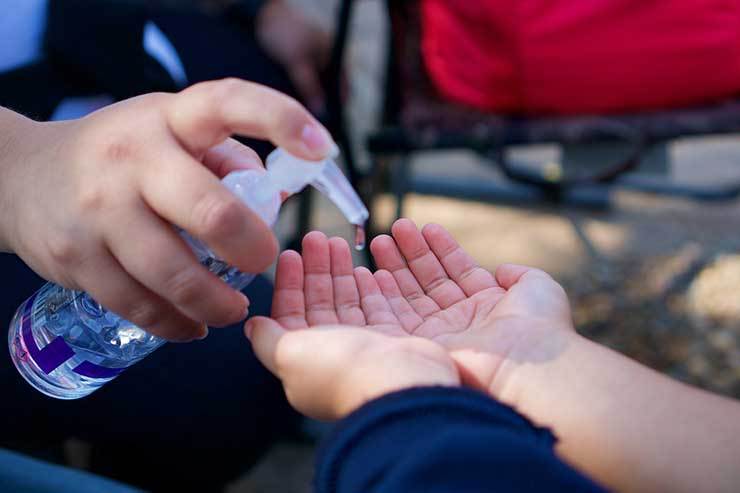
In certain cases, hand sanitizers based on alcohol can easily minimize the number of microbes on the hands but not all kinds of germs are removed through them. The elimination of germs such as Cryptosporidium and Clostridium can be more efficient than hand sanitizers. Although hand sanitizers using alcohol can very effectively inactivate several types of microbes when properly applied. Hand sanitizers come with some side effects which may affect your skin and can cause a lot of effects. They are an indispensable tool to combat COVID-19 spread, but they are having side effects also. The leading professionals have shared some advice to minimize the side effect of hand sanitizers and lessen the pain so that you still can use hand sanitizers without any problems. So just read on and ensure your health and other people’s health from the below information.
1. You may get a skin disease
The overuse of alcohol-based hand sanitizers to avoid germs and pathogens causing infection could increase the risk of infection by skin disorders inversely. Overuse of hand sanitizers can remove good skin bacteria also and can damage the skin.
2. Sanitizers can make your skin irritable
Too often use of hand sanitizers can cause rubbing and itching at your hands and can cause rashes and redness. Hand sanitizers are antiseptic products and comprise of Ethyls and isopropyl alcohol that are the primary dis-infective ingredient which is used in hand sanitizing formulae and are formulated along with the use of thickeners, softeners, and fragrances to curb the strong smell of alcohol. The frequent use of this ingredient can lead to irritations in the skin or dry the skin and ultimately leading to damage to the skin.
3. Certain formulas can affect fertility
Some hand sanitizers comprise alcoholics like ethyl alcohol as an active ingredient that functions as an antiseptic. Several research studies have reported that triclosan is a health hazard ingredient. Its overuse has negative effects on fertility, fetal development, and rates of asthma. You should wash hands with water and soap to completely eradicate the germs. You should use sanitizers only when water and soap are not available.
4. Some hand sanitizers could cause antibiotic resistance
The probability of bacteria developing antibiotic resistance is increased by exposure to triclosan that is present in hand sanitizers.
5. Hand sanitizers can increase your eczema risk
The CDC recommends that a hand sanitizer that contains 60 percent or more of alcohol is harmful to hands. You should wash your hands with soap and water for at least 20 seconds, to prevent the spread of the corona virus. This advice is necessary but increased contact with irritants and allergens can lead to an increase in the risk of hand dermatitis or eczema which is usually present on the skin with redness, dryness, cracks, and even blisters, which cause itch or pain.
6. Hormone problems some can cause
Triclosan is a hand sanitizer that also causes hormone problems, according to the FDA. The bacteria are thus adapted to their antimicrobial properties, which contribute to more antibiotic-resistant strains.
7. Something impacting the immune system
The human immune function against triclosan is weak and too much use of hand sanitizer increases the risk. The compromised immune system makes people more allergy-prone so one should not use excessive use of hand sanitizers.
8. Some can affect the development of your body
Toxic chemicals like phthalates and parabens can also be loaded with a hand sanitizer that has too much fragrance. Phthalates can influence the development and reproduction of the human body. Parabens are chemicals that can adversely impact hormone functioning, fertility, birth, and breeding.
9. Too much use of hand sanitizer can lead to alcohol poisoning
Since many hand sanitizers contain high alcohol levels, doctors see cases of alcohol poisoning when they are soaked. Since hand sanitizers are easily available, there have been many cases globally where teenagers were hospitalized with alcohol poisoning from excessive use of hand sanitizers. Hand sanitizers are considered to be a good alternative to reduce potentially infectious microbial load such as viruses, bacteria, fungus on the hands or skin if soap and water are not immediately available. Hand sanitizers do not remove physical dirt/ grime/mucus, and so are not meant for physically washing your hands.
Conclusion
CDC recommends washing your hands whenever possible with soap and water because hand washing reduces all forms of germs and chemicals in your hands. However, if soap and water are not available, it will help you avoid getting sick and scaling germs with a hand sanitizer with at least 60 percent alcohol.
Source: Times Applaud